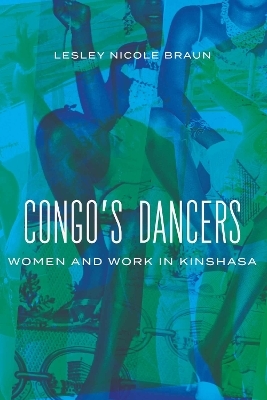
Congo's Dancers
Women and Work in Kinshasa
Seiten
2024
University of Wisconsin Press (Verlag)
978-0-299-34034-6 (ISBN)
University of Wisconsin Press (Verlag)
978-0-299-34034-6 (ISBN)
- Noch nicht erschienen (ca. Dezember 2024)
- Versandkostenfrei innerhalb Deutschlands
- Auch auf Rechnung
- Verfügbarkeit in der Filiale vor Ort prüfen
- Artikel merken
In Congo’s Dancers, Lesley Nicole Braun uses the prism of the Congolese danseuse to examine the politics of control and the ways in which notions of visibility, virtue, and socioeconomic opportunity are interlinked in this urban African context. Its introduction in the late 1970s raised Congolese rumba’s international profile.
Dance music plays a central role in the cultural, social, religious, and family lives of the people of the Democratic Republic of Congo. Among the various genres popular in the capital city of Kinshasa, Congolese rumba occupies a special place and can be counted as one of the DRC’s most well-known cultural exports. The public image of rumba was historically dominated by male bandleaders, singers, and musicians. However, with the introduction of the danseuse (professional concert dancer) in the late 1970s, the role of women as cultural, moral, and economic actors came into public prominence and helped further raise Congolese rumba’s international profile.
Lesley Nicole Braun uses the prism of the Congolese danseuse to examine the politics of control and the ways in which notions of visibility, virtue, and socioeconomic opportunity are interlinked in this urban African context. The work of the danseuse highlights the fact that public visibility is necessary to build the social networks required for economic independence, even as this visibility invites social opprobrium for women. The concert dancer therefore exemplifies many of the challenges that women face in Kinshasa as they navigate the public sphere, and she illustrates the gendered differences of local patronage politics that shape public morality. As an ethnographer, Braun had unusual access to the world she documents, having been invited to participate as a concert dancer herself.
Dance music plays a central role in the cultural, social, religious, and family lives of the people of the Democratic Republic of Congo. Among the various genres popular in the capital city of Kinshasa, Congolese rumba occupies a special place and can be counted as one of the DRC’s most well-known cultural exports. The public image of rumba was historically dominated by male bandleaders, singers, and musicians. However, with the introduction of the danseuse (professional concert dancer) in the late 1970s, the role of women as cultural, moral, and economic actors came into public prominence and helped further raise Congolese rumba’s international profile.
Lesley Nicole Braun uses the prism of the Congolese danseuse to examine the politics of control and the ways in which notions of visibility, virtue, and socioeconomic opportunity are interlinked in this urban African context. The work of the danseuse highlights the fact that public visibility is necessary to build the social networks required for economic independence, even as this visibility invites social opprobrium for women. The concert dancer therefore exemplifies many of the challenges that women face in Kinshasa as they navigate the public sphere, and she illustrates the gendered differences of local patronage politics that shape public morality. As an ethnographer, Braun had unusual access to the world she documents, having been invited to participate as a concert dancer herself.
Lesley Nicole Braun is a research associate at the Institute for Social Anthropology at the University of Basel.
List of Illustrations
Acknowledgments
Introduction
Chapter 1
Women and Dance in Congo’s Modern History
Chapter 2
Overlapping Tempos
Chapter 3
Dance Formations
Chapter 4
From Containment to Entrapment
Chapter 5
Working through Encadrement
Coda
Notes
Bibliography
Index
| Erscheint lt. Verlag | 17.12.2024 |
|---|---|
| Zusatzinfo | 12 b&w illus. |
| Verlagsort | Wisconsin |
| Sprache | englisch |
| Maße | 152 x 229 mm |
| Gewicht | 399 g |
| Themenwelt | Geisteswissenschaften ► Geschichte ► Regional- / Ländergeschichte |
| Sozialwissenschaften ► Ethnologie | |
| Sozialwissenschaften ► Soziologie ► Gender Studies | |
| ISBN-10 | 0-299-34034-1 / 0299340341 |
| ISBN-13 | 978-0-299-34034-6 / 9780299340346 |
| Zustand | Neuware |
| Haben Sie eine Frage zum Produkt? |
Mehr entdecken
aus dem Bereich
aus dem Bereich
Erinnerungen
Buch | Softcover (2024)
Pantheon (Verlag)
16,00 €
Universalgelehrter, Polarreisender, Entdecker
Buch | Hardcover (2024)
mareverlag
28,00 €


